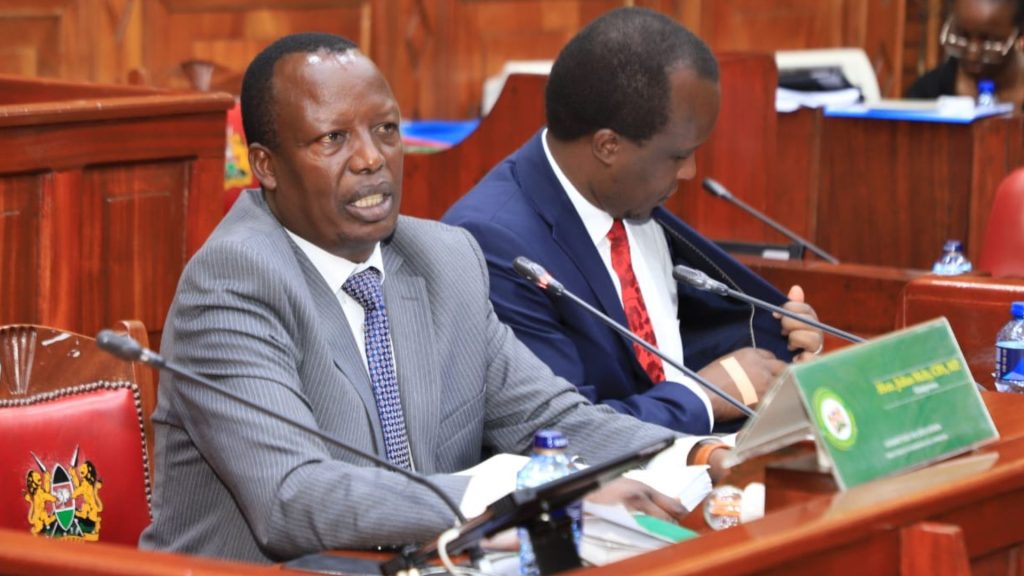Public Universities Face Sh60 Billion Debt as KEPSA Pushes for Rapid Policy Reforms.
The Kenya Private Sector Alliance (Kepsa) has now put forward a list of proposed reforms to the education sector to the National Assembly, insisting that lawmakers take action to bring stability back to the sector and get institutions performing better.
These reforms, which focus on student loans, how the education system is run, making people accountable, and boosting research, have been laid out at a meeting in Mombasa between the National Assembly leadership and Kepsa.
This meeting – which sees the Speaker of the National Assembly, Moses Wetang’ula joining forces with senior people from the private sector, and all the departmental committee chairs – is focused on tackling all the issues affecting the business environment, discussing the state of the economy, working out what its costing to run a business, and dealing with the issue of sky-high electricity costs.
They’re also on the lookout for changes that would make the regulatory framework more attractive to businesses and enhance economic development.
Kepsa’s suggestions on sorting out higher education financing call on the government to rewrite the Higher Education Loans Board Act and instead create a sustainable student financing framework that includes grants, work experience programmes, and loans that are dependent on your income – all aimed at increasing access to education and reducing student loan defaults.
Kepsa has also proposed to Parliament that they set up a Higher Education Fund to make it easier for universities to get the long-term financial support they need, from both government and the private sector, and even from former students.
The Alliance is also asking for incentives to help come up with innovative new financing models like university endowment funds and public-private partnerships for building infrastructure and making sure the universities are running in a way that’s financially sustainable.
With regards to governance and making sure people are held accountable, the Alliance is calling on Parliament to change the Universities Act so that the people running universities are clear about their roles and responsibilities, and so that there’s no duplication of effort between the Commission for University Education and the Ministry of Education.
Kepsa also wants Parliament to ensure that people are appointed to university roles based on merit and that there are clear and transparent processes in place to make sure new university councils and vice chancellors are the right people for the job.
Kepsa is also calling for a bit more oversight from Parliament on university finances, procurement and infrastructure so that taxpayers get value for their money.
On the topic of university research and quality, Kepsa wants Parliament to make sure that at least 1% of the country’s GDP is put into research over the next few years.
They also want new laws that will support research being turned into something that can be sold, and make sure that people who come up with new ideas get the protection they need to turn those ideas into actual products.
Kepsa has pointed out that Kenya’s public universities have been in deep financial trouble for a while, with debts reaching Sh60 billion and salaries, pensions and other costs not being paid on time.
They’ve made clear that the country’s higher education sector is facing serious problems with funding, standards of quality, and governance. Kepsa says that unless these problems are solved, the higher education sector will not be able to meet the country’s development goals.
In July , the Higher Education Loans Board dropped a bombshell on the National Assembly Education Committee – they are strapped for cash, and because of that a whole lot of students are being left high and dry when it comes to financial support.
Read Also: KUPPET Raises Alarm Over Safety of 150 Kenyan Teacher Trainees in Tanzania Amid Political Crisis
According to HELB, they were crying out for Sh48 billion last time around but only managed to scrape together Sh26 billion, which has meant that more than 100,000 students are being left without a full grant, and who knows, some of them might be getting by on nothing more than just their upkeep allowance.
HELB’s top brass told the committee, chaired by the ever diligent Julius Melly, that what would really sort them out is if Kenya went the way of Ghana and set aside three percent of Value Added Tax for student funding – that way they’d be sorted for the long haul.
Public Universities Face Sh60 Billion Debt as KEPSA Pushes for Rapid Policy Reforms.
